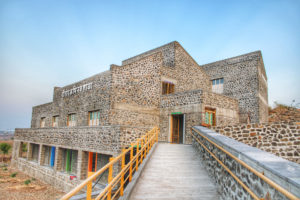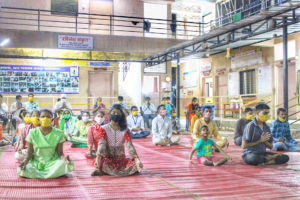Government disregards disabled persons during pandemic

Anamprem’s new, well-designed school building in Ahmednagar is ready to receive students but has to wait for the pandemic to get over (MIG photos/Varsha Singh)
Voluntary organisations as well as family members of the disabled are left to fend for themselves as government ignores the needs of persons with special needs.
At first glance, it looks like a scene from a Clint Eastwood-starrer Western film or our own home production, Sholay. A barely visible, dusty motorable path, with more rocks than dust, that has been cut at bizarre angles through boulders twice as big as a human. Suddenly, as the path dips sharply, a magnificently designed granite building in a fenced compound comes into view.
Finally, at the base of the shallow valley, one comes to the main gate of Anamprem Gaurang Abhinav School, a residential school and an orphanage for children with special needs, including visually impaired, deaf, mute, motor-deficient children as well as autistic and mentally-challenged ones. Operational since 2005, the school is home to 200 children, including 50-60 girls in the age group 6-30 years and has become a landmark institution not just in Ahmednagar district in western Maharashtra but indeed for the entire region as families reach out to it for their children with special needs.
Besides providing schooling to the children, Anamprem is involved in the overall development of the children, with healthcare, nutrition, skill development, internships and job placement. In fact, it goes so far as to organise a mass wedding of persons with special needs each year in order to help its grown up children settle down in their lives and build a family.
However, for the past four months, ever since the coronavirus pandemic outbreak, all the activities of the school have ground to a complete halt following a government order shutting down all schools. Most of the children have been forced to go back to their families severely disrupting their lives, as neither the families nor their homes are properly equipped to handle the children or their special needs. ‘‘Clearly, the government did not think about the disabled people, especially the children, when it clamped down on all schools four months ago. In our hostels, we had all facilities to take care of the children and their special needs, but they were obliged to leave due to the coronavirus outbreak. But the children are facing big problems even with the simplest of daily chores such as going to a toilet or sanitising their hands. Most of our country lacks even the most basic facilities for the disabled, starting with access. And the families are in absolutely no position to take care of their wards with special needs as they lack even the basic facilities like a disabled-friendly toilet,’’ says Ajit Kulkarni who has run Anamprem since it was founded.
Autistic and children with other mental health challenges have suffered the most during the lockdown, he says. ‘‘It is vital for their well-being that they undertake physical activities to burn off their excessive energy and calm down. However, already their parents are unable to understand what needs to be done and even when they know that they must provide physical activities to these children, the lockdown has meant that they have stayed locked up indoors at a very heavy cost to their health,’’ cautions Girish Kulkarni, founder of Snehalaya, an NGO based in Ahmednagar that runs Anamprem.
Another problem is that the children who could not go back have remained blocked inside the hostel for over four months. ‘‘They needed passes and that was a cumbersome process with again lack of access for the disabled and we did not have resources to ensure that not only the travel passes were made but also arrange transport for them as many of their parents could not leave their homes or afford a special transport,’’ says Ajit Kulkarni.
Yet, not only did the government closed the schools, it also told all NGOs with residential facilities for the disabled that if any child dies onsite during the pandemic, it would be considered as a ‘custodial death’ or the responsibility of the NGO. ‘‘When this order was passed, no organisation wanted to take a risk as custodial deaths can have a big impact on the organisation and its future. So, thousands of institutions all over the country shut down and told the families to come and take their children and all of this was happening during the lockdown, putting tremendous strain on the families,’’ says Girish Kulkarni.

At Anamprem, the day starts and ends with a prayer and spiritual session as well as updates on news of the day
Despite the government’s indifference, the numbers of disabled persons in India are daunting. The country is home to a third of the world’s blind population, with about 12 million individuals with visual impairment as against the global total of 39 million, according to a report published by the National Programme for Control of Blindness (NPCB). Despite this, when it comes to accessibility of education, healthcare and employment, the visually impaired are cut off. Only 29.16 pc of the blind in India are part of the education system as per a survey conducted by the National Council of Educational Research and Training (NCERT). The prevalence of blindness is higher among population having lower socio-economic status. Females are found to have a higher preponderance of blindness as compared to males, and the prevalence is significantly higher in rural areas.
Not just the visually impaired, Ajit Kulkarni goes on to say that the government has badly failed all the disabled students and as a result they have fallen significantly behind other students. ‘‘As it is, the disabled children staying with us come from the most underprivileged families. They were sent to our organisation mainly because the parents lack the wherewithal and financial resources to take care of the children with special needs. The government has been claiming that all the students have been continuing with their education online since the schools were shut. But, most of the families whose children we work with cannot afford a tablet or even a smartphone just for the child, so how will the child learn? Moreover, the officials are ignorant of even basic issues like it is just not possible to run online classes for disabled as the special course material and equipment needed is just not there with the students at their homes,’’ says Ajit Kulkarni.
Snehalaya’s Girish Kulkarni estimates that just in the state of Maharashtra, there are over 6,000 special needs children in about 350 residential schools and over 8,000 students that are churned out each year from vocational education centres in the state. He adds that lack of reliable data on these organisations goes on to show the priority accorded by the government to the disabled children.
Ajit Kulkarni says that the government failed the disabled on several front. First, it closed their schools and hostels, second it also failed to provide essential goods like food rations to the poor families that the students at Anamprem come from. As no support was forthcoming from the government to the families of the disabled children, Anamprem took it upon itself to render all assistance within its means. ‘‘First we addressed hunger as these children come from very poor families. So through digital payment like GooglePay we paid the grocers nearest to their homes and ensured that each family obtained food worth INR 500. We have done this for about 400 families so far. Another initiative that we are undertaking is to approach the courts with a public interest litigation asking the government to not ignore the problems being faced by disabled children in pursuing online classes that schools all over the country have been conducting over the past four months,’’ he says.
The PIL will ask for the government to conduct special classes for the special needs children and to use the internet facilities available at the village council. ‘‘Also, on the existing educational programmes being broadcast by national broadcaster Doordarshan, they should add teaching using sign language to allow the deaf students to study,’’ he says.
Anamprem is also expediting the completion of a new hostel fully equipped for children with various kinds special needs. Ajit Kulkarni says that his efforts are to complete the building at the earliest and then admit children so that not only can they be fed and provided a suitable accommodation, but also provide professional support to them in order to overcome their deficiencies.
Meanwhile, the students who could not go back home and have been staying at Anamprem since the closure of schools, say they are taking precautions but not unduly worried about getting infected. “The divyang (disabled) community is facing a crisis because of coronavirus. There are many challenges for us and one of which is how to maintain social distancing and the other is that we can’t travel. Even though I have taken this disease seriously but I am not scared of it. I am taking all the necessary precautions that have been suggested by the central government. We are trying to spread awareness about coronavirus amongst the disabled community,” says 27-year-old Rameshwar Fatangade.
But despite the support of their caretakers and other children at Anamprem, the children appear to be troubled by the uncertainty. ‘‘Because of coronavirus, we cannot go anywhere and are blocked here. Washing hands regularly and wearing a mask has become a necessity, but for how long are we supposed to go on like this,’’ says Shobha Sagare, who is also visually impaired and lives at Anamprem.
Not just education and training, the disabled children have been hit the hardest on the employment as most companies that have resumed work have not recalled the disabled persons for work. ‘‘There are many such reports and the main reason is that with the new regulations about the companies providing shelter to employees near the workplace, they cannot locate residential facilities that are equipped for the disabled. So there have been numerous cases where the disabled find themselves out of a job in this extremely difficult period,’’ says Girish Kulkarni.
The government does not run even a single hostel to take care of young disabled persons and there are only a handful of such facilities operated by private organisations and many of them have faced problems in running them.
With over 6 pc of India’s 1,365 million persons or 82 million suffering from a form of disability, if India’s disabled were a country, it would be the 20th largest country in the world. At no given point have the government officials been particularly focused on this community. Unfortunately, there has not been a change in their attitude even amidst the crisis provoked by the pandemic outbreak.









